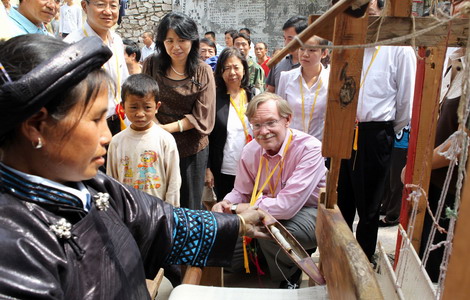 |
|
|
|
|||||||||||
|
 World Bank President Robert Zoellick looks into conditions in Xianahui county of Qianxinan autonomous prefecture in Guizhou province in this file photo taken last September. Here, he watches a villager demonstrating spinning techniques. [Photo / China Daily] |
World Bank chief: Economists from China should hold high positions
Emerging economies should play a bigger role in the World Bank and more Chinese economists and researchers should hold high positions in the global financial institution, said World Bank President Robert Zoellick.
"My view has been to treat the developing nations as clients, understand what they want to address, and then bring a global experience and expertise to help them address the problems," Zoellick told China Daily at the Boao Forum for Asia 2012, which took place earlier this month in Hainan province.
His words came as the World Bank is looking to pick its next leader, and Zoellick is expected to step down from his position in June.
Although the next top official at the World Bank is unlikely to come from China, more Chinese economists and researchers are expected to be employed in high positions and as executives at global financial institutions. Chinese officials are "important" for the World Bank, he said.
US President Barack Obama has nominated Jim Yong Kim, a Korean-American and president of Dartmouth College who has worked to fight disease in impoverished countries, to lead the World Bank. Also contending for that position are Ngozi Okonjo-Iweala, Nigerian finance minister, and Jose Antonio Ocampo, former Colombian finance minister.
The nomination of candidates from emerging markets is widely believed to be a challenge to the US dominance of the institution. A representative of that country has held the top position at the institution since it was founded after World War II.
Sources from the World Bank, who asked not to be named, said Kim will probably be the next leader of the World Bank.
"I don't make the choice, unfortunately but the good news is there are three very good candidates for the succession. That's a good sign for the future of the World Bank, that you have top quality people and candidates."
The World Bank board of member countries has said it will make a decision about the leadership position by the time the International Monetary Fund and World Bank hold their semi-annual meetings on April 21.
Canada, Japan and other countries said they support Kim's nomination and that they will solicit support for his candidacy.
So far, the only candidate who has been officially nominated is Jeffrey Sachs, a US development economist and professor at Columbia University.
More Chinese
A European has always led the World Bank's sister organization, the IMF.
Emerging economies such as China, India and Brazil have meanwhile put pressure on the United States and Europe to open those positions to candidates from other places.
Last year, the 187 member countries in the World Bank agreed that a transparent process should be used to select a bank president in accordance with his merits.
Zoellick said he is in favor of such reforms being made at the World Bank.
"As for the role of developing countries, I tried to bring in more people from developing countries (to put into high positions in the World Bank)," said Zoellick.
He said he strongly believes developing countries are the World Bank's chief clients, and "I think we should focus on what the clients want", rather than saying "developing countries should do this or that".
China has strengthened its influence on global financial institutions in recent years.
In 2008, the World Bank appointed the Chinese economist JustinYifu Lin to be the chief economist and senior vice-president of the institution.
Zoellick said his "only worry is that there are so many opportunities in China, and it may be harder to recruit some of them for the bank".
dingqingfen@chinadaily.com.cn